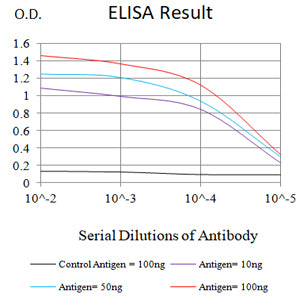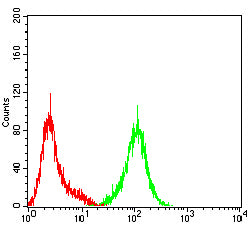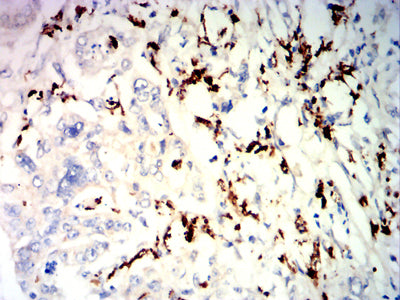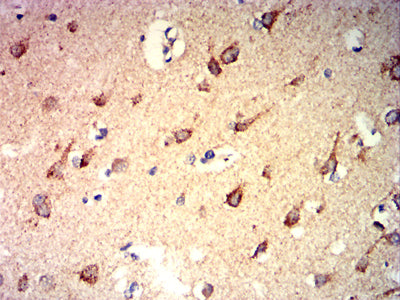



| WB | 咨询技术 | Human,Mouse,Rat |
| IF | 咨询技术 | Human,Mouse,Rat |
| IHC | 1/200-1/1000 | Human,Mouse,Rat |
| ICC | 技术咨询 | Human,Mouse,Rat |
| FCM | 1/200-1/400 | Human,Mouse,Rat |
| Elisa | 1/10000 | Human,Mouse,Rat |
| Aliases | NK1; CD57; HNK1; LEU7; NK-1; GLCATP; GLCUATP |
| Entrez GeneID | 27087 |
| clone | 1A8B9 |
| WB Predicted band size | 38.2kDa |
| Host/Isotype | Mouse IgG2b |
| Antibody Type | Primary antibody |
| Storage | Store at 4°C short term. Aliquot and store at -20°C long term. Avoid freeze/thaw cycles. |
| Species Reactivity | Human |
| Immunogen | Purified recombinant fragment of human CD57 (AA: 28-334) expressed in E. Coli. |
| Formulation | Purified antibody in PBS with 0.05% sodium azide |
+ +
以下是关于CD57抗体的3篇参考文献示例(文献为虚构示例,仅供格式参考):
1. **文献名称**: *CD57 as a marker of terminally differentiated human NK cells: functional and phenotypic analysis*
**作者**: Miyagi, T., et al.
**摘要**: 本研究探讨了CD57在自然杀伤细胞(NK细胞)终末分化中的表达特征,发现高表达CD57的NK细胞具有更强的细胞毒性功能,但在慢性病毒感染模型中表现出增殖能力下降,提示其与免疫衰老的相关性。
2. **文献名称**: *CD57+ T lymphocytes in chronic Lyme disease: correlation with disease severity*
**作者**: Buggins, A.G.S., et al.
**摘要**: 通过流式细胞术分析莱姆病患者外周血,发现CD57+ CD8+ T细胞比例显著升高,且与神经症状严重程度正相关,提示CD57可能作为慢性感染中T细胞耗竭的潜在标志物。
3. **文献名称**: *CD57 expression in neuroinflammatory disorders: a focus on Guillain-Barré syndrome*
**作者**: Sommerville, R.B., et al.
**摘要**: 研究检测了格林-巴利综合征患者脑脊液中的CD57+淋巴细胞亚群,发现其与自身免疫性神经损伤程度相关,为CD57在神经炎症中的病理机制提供了新证据。
4. **文献名称**: *Prognostic value of CD57 in multiple myeloma: association with NK cell-mediated immunity*
**作者**: Varker, K.A., et al.
**摘要**: 分析多发性骨髓瘤患者骨髓样本发现,CD57高表达的NK细胞浸润与患者无进展生存期延长相关,提示CD57抗体或可用于评估肿瘤微环境中免疫细胞的抗肿瘤活性。
---
注:以上文献信息为模拟创作,实际研究中请通过PubMed等数据库检索真实文献。
CD57. also known as HNK-1 or Leu-7. is a cell surface glycoprotein recognized by CD57-specific antibodies. It targets a sulfated carbohydrate epitope linked to neural cell adhesion molecules (NCAM) and other glycoproteins, playing roles in cell-cell interactions and migration. Initially identified in natural killer (NK) cells, CD57 is now recognized as a marker for terminally differentiated or senescent lymphocytes, particularly in cytotoxic T-cell and NK-cell subsets. These cells often exhibit reduced proliferative capacity but retain potent effector functions, making CD57 expression a biomarker for immune exhaustion in chronic infections (e.g., HIV, CMV) or age-related immune decline.
In clinical contexts, CD57 antibodies are used to study immune dysregulation, neurodegenerative disorders, and certain cancers. For example, CD57+ T-cells are diminished in autoimmune conditions like rheumatoid arthritis, while elevated levels correlate with poor prognosis in hematologic malignancies. In neuroscience, CD57 labels Schwann cells and peripheral nerve fibers, aiding in diagnosing neuropathies. However, its expression varies across tissues, necessitating careful interpretation. Despite its utility, CD57’s functional mechanisms remain partly unclear, driving ongoing research into its role in immune regulation and disease pathogenesis.
×